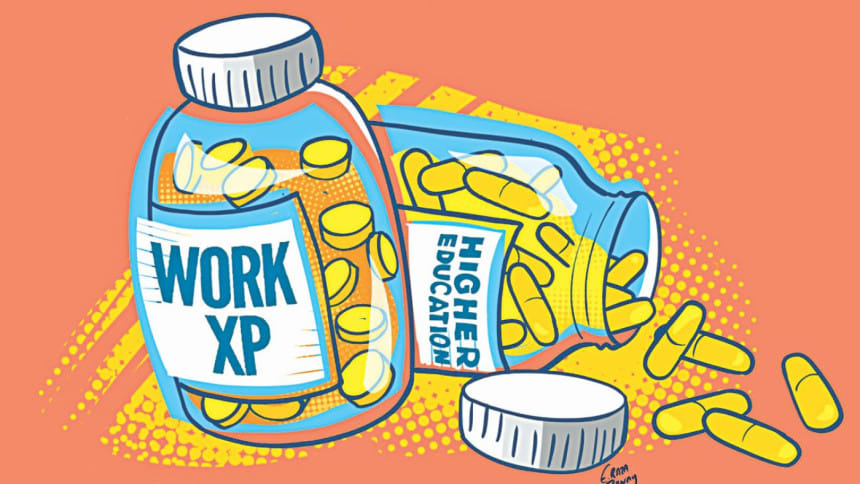Education vs. Experience

Slowly but surely, as I approach the end of my undergraduate life, one thought occupies most of my time. What do I do once I graduate from university? Do I enter the job market immediately and focus on gathering as much experience as I can or do I go for higher education? Will further pursuance of higher education give me an edge in the job market or is that unnecessary? Then again, even if I choose to pursue higher education, should I just go for master's within the country or apply to foreign universities?
The answers to all these questions are not easy to find, especially when there are many variables in play. Higher education and job experience can be compared to two tips of a scale. Comparing these two tips of the scale and calculating which tip weighs more can be very tricky as there is no absolute metric to calculate the better option.
This debate of whether one should go for higher education or job experience after graduating is as old as higher education itself. Besides, there are so many prevalent arguments regarding this topic, which doesn't exactly make the decision-making any easier. Some of the main arguments are:
Argument 1: A higher degree guarantees a particular skill set which can be translated into work skills.
Argument 2: Success in hands-on work is more valuable than success in higher education.
Argument 3: Work experience doesn't necessarily provide the exact set of skills needed for the future jobs that you will have.
Argument 4: Higher education only enables success in academia and not necessarily in the real job environment.
The actual reality of the education vs. experience debate is that no single argument can cover all the potential situations of a fresh graduate who is weighing his/her options of choosing one over the other.
In an ideal scenario without the either/or dilemma, a candidate would be able to show both tertiary degree and work experience which would equip him/her to perform better in the sought-after job. This optimal combination would require taking a slower route through the journey of tertiary education, in order to have time available for employment. This will help people to see the firsthand value of their educational applications in the real-life scenario. But to what extent are people successful in implementing this ideal case in their practical lives?
On one hand, a lot of focus graduates want to jump right into the job market and climb up the career ladder as fast as they can because this is when they have a lot of energy to gather up practical work skills. In the highly growing and competitive job market, where everything moves at a fast pace, they don't want to be left behind. On the other hand, another group of graduates believes that higher education will give them better knowledge regarding relevant jobs before they actually enter the job market, which will improve their performance through better understanding.
In reality, there are a lot of variables at work.
The timing matters. The time needed to obtain the degree and for certain disciplines, the time during which the degree is being pursued should be taken into account. A degree obtained in the technological field might become obsolete without accumulation of relevant work experience. Things change rapidly in this field and it is necessary to keep up with the trends.
The field of work matters. Someone who is planning to acquire a higher degree should take into account the actual line of work they are going to work in. Some lines of work might demand higher education, whereas others may demand a level of job expertise that a degree won't suffice.
There is another way one can decide which to choose and that is to look at the numbers. According to the National Bureau of Labor Statistics, tertiary education pays in higher earnings but up to a certain point. A master's degree gets you more money than a bachelor's degree but a doctoral degree, which is the highest point of education attainment gets you less money than a professional degree.
Abreshmee Haque, brand manager at a multinational FMCG company said, "For a global career, a degree from abroad is helpful. However, in most companies of the country, on-the-job learning opportunities are great where you get to learn everything that's needed specific to your role." Rashed Kabir, who is doing his undergrad in Pharmacology at the University of Manchester said he had to do a placement year at a pharmaceutical company in Germany last year and he preferred it more than studying. Arshia Haque, studying in DevLAB at Oulu University of Applied Sciences said, "People should go for higher education if they want to have extensive research based knowledge on a particular field. Reasons to have a job right away would be to build up the career profile which brings a lot of stability as well."
In the end, the choice between job experience and higher education is very subjective and seems to be exclusive to the individual's circumstances. The final decision should be taken after proper consideration of all relevant variables and trade-offs.
Nabila Hossain is a senior at IBA, DU. Reach her at [email protected]

 For all latest news, follow The Daily Star's Google News channel.
For all latest news, follow The Daily Star's Google News channel. 








Comments